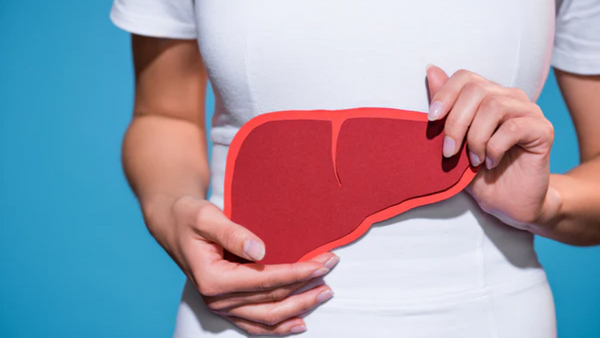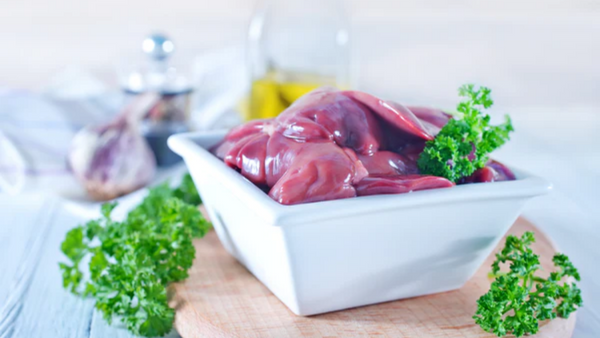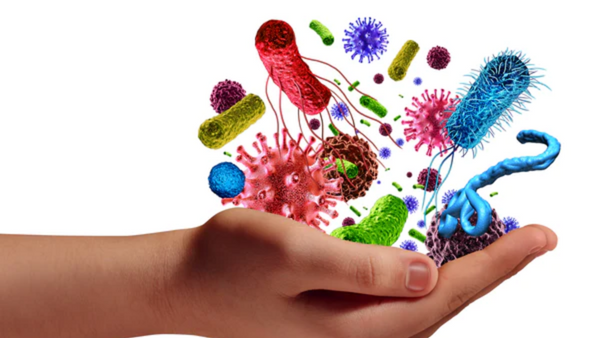Offal is significantly richer in nutrients than muscle meat. And of all offal, liver is particularly rich in nutrients. This is not surprising, as liver serves as a storage facility for many vitamins and minerals in the body. At the same time, it is low in fat and high in protein.
Nutrients in liver
The following nutrients provide a good overview of vitamins and minerals in beef liver: [1]
|
Micronutrient |
Content per 100 g |
% of the recommended daily allowance [2] |
|
Vitamin A |
4.9mg |
544 |
|
Thiamine (vitamin B1) |
0.2mg |
18 |
|
Riboflavin (vitamin B2) |
2.8mg |
224 |
|
Niacin (vitamin B3) |
13.2mg |
98 |
|
Vitamin B6 |
1.1mg |
81 |
|
Folic acid (vitamin B9) |
290ug |
97 |
|
Vitamin B12 |
59.3ug |
1482 |
|
Vitamin C |
1.3mg |
1 |
|
Vitamin D |
49 IU |
6 |
|
Vitamin E |
0.38mg |
3 |
|
Vitamin K |
3.1ug |
5 |
|
Calcium |
5mg |
0.5 |
|
iron |
4.9mg |
39 |
|
potassium |
313mg |
8 |
|
copper |
5.8mg |
784 |
|
magnesium |
18mg |
6 |
|
sodium |
69mg |
5 |
|
phosphorus |
387mg |
55 |
|
zinc |
4mg |
47 |
Vitamin A
Liver is particularly rich in vitamin A. It is also present in the active form, which the body can use particularly well. 100 g of liver provide enough vitamin A for several days.
Vitamin A has important functions in iron metabolism and the immune system. It also helps maintain vision and skin. [3]

Vitamin B12
Vitamin B12 is only found in animal foods. Liver is particularly rich in this vitamin. Liver provides almost 15 times the daily requirement of vitamin B12!
Vitamin B12 is important for energy metabolism, the immune system and the nervous system. It also helps reduce tiredness and fatigue and is important for mental health. Vitamin B12 also has important functions in homocysteine metabolism. Homocysteine is a toxic metabolic product and vitamin B12 is involved in its breakdown. Elevated homocysteine levels are harmful to the body and increase the risk of many diseases, such as thrombosis and cardiovascular disease. [4]
Other B vitamins
Liver is also a good source of other B vitamins , such as riboflavin (vitamin B2), folic acid (vitamin B9), vitamin B6 and vitamin B3.
Vitamin B2 is important for energy metabolism, the nervous system and iron metabolism. It also helps protect cells from oxidative stress.
Folic acid (vitamin B9) has important functions in the immune system and in cell division. It also contributes to normal psychological function.
Vitamin B6 is important for energy metabolism, the nervous system, the immune system and homocysteine metabolism.
Vitamin B3 is needed in energy metabolism and in the nervous system. It also contributes to normal psychological function. [5]

zinc
Beef liver is also rich in zinc . 100 g cover almost half of the daily requirement. Zinc has many functions in the body. It is important for skin, hair and nails. It also contributes to normal fertility and reproductive capacity and is needed for the immune system. It is also important for cognitive function. [6]
iron
Liver is also a very good source of iron. Iron is easily lacking in the diet. Women in particular often have problems meeting their iron requirements.
Iron is needed for the formation of red blood cells and for oxygen transport. It contributes to the reduction of tiredness and fatigue and to normal cognitive function. Iron is also important for the immune system. [7]
[1] https://fdc.nal.usda.gov/fdc-app.html#/food-details/169451/nutrients
[2] https://www.dge.de/forschung/referenzwerte/
[3] https://ods.od.nih.gov/factsheets/VitaminA-Consumer/
[4] https://pubmed.ncbi.nlm.nih.gov/28722952/
[5] https://pubmed.ncbi.nlm.nih.gov/31644020/

















